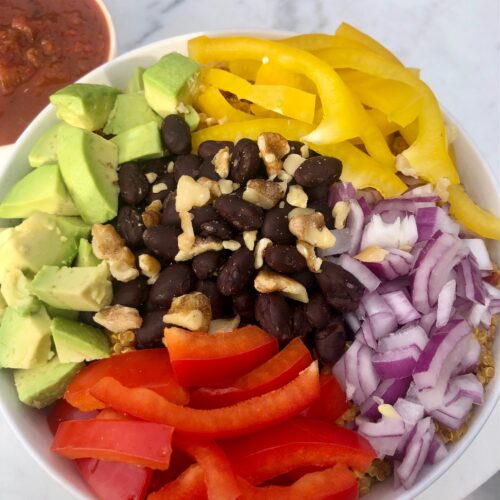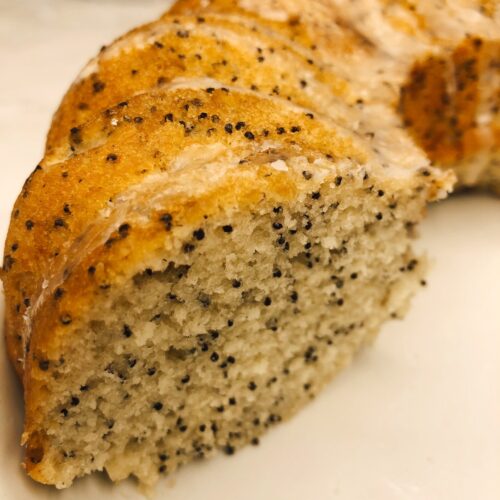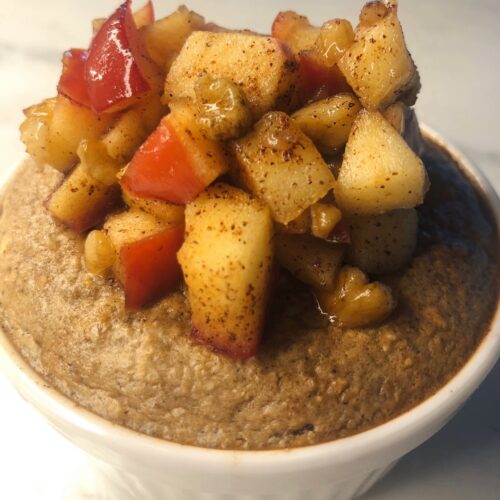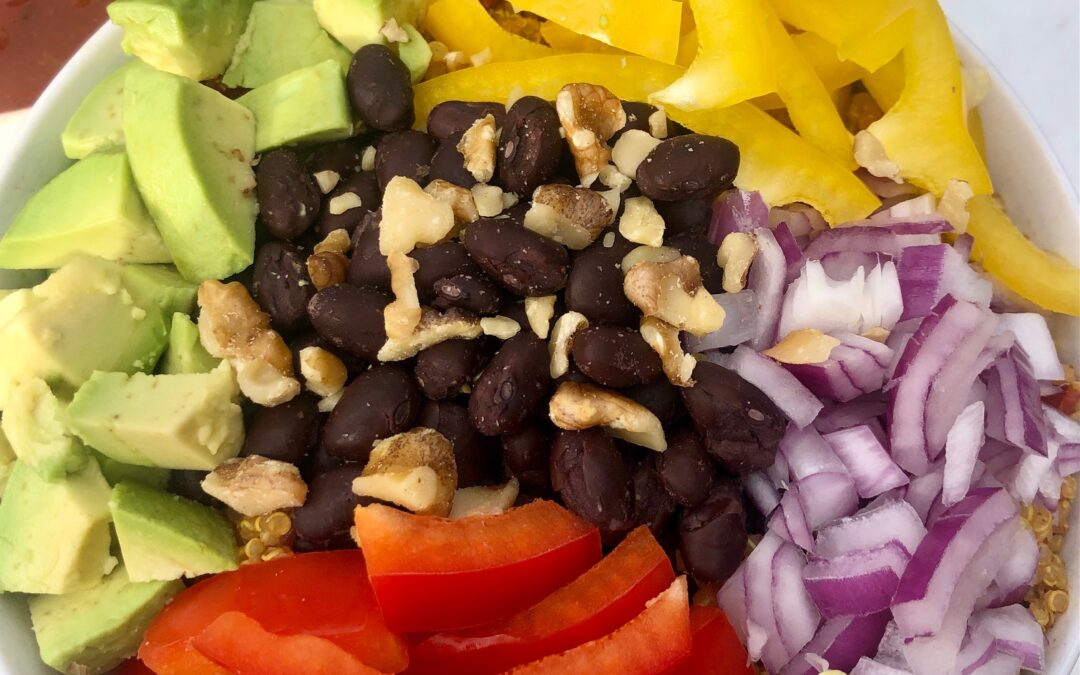
by Julie Pace, RDN | Feb 13, 2022
Quinoa Taco Salad
This colorful Quinoa Taco Salad makes a healthy and delicious breakfast, lunch or dinner. It's super easy to make and ready in less than 20 minutes. This delicious dish is a great balance of fiber, protein, colorful veggies and healthy fats to help keep you nourished and satisfied.
Prep Time 5 minutes mins
Cook Time 15 minutes mins
Total Time 20 minutes mins
Course Breakfast, Lunch, Main Course
Cuisine American, Mexican
- 2 teaspoons avocado oil
- 1 cup organic dry quinoa rinsed
- 1 Tbsp nutritional yeast
- 1 Tbsp cumin
- 1 teaspoon chili powder
- 1/2 tsp garlic powder
- 1/2 tsp onion powder
- 1/2 tsp salt
- 1/4 tsp turmeric
- 1 can mild Rotel tomatoes
- 1-1/2 cups vegetable broth
- 1 can black beans drained and rinsed.
- 1 large red bell pepper sliced
- 1 medium red onion sliced
- 1 large avocado sliced
- 1/4 cup walnuts
Add oil to a medium sauce pan on medium heat. Add in dry quinoa and heat for 1-2 minutes. Stirring constantly.
Add in seasonings nutritional yeast, cumin, chili powder, garlic and onion powder, salt, turmeric. Heat for another 1-2 minutes, stirring constantly.
Add in undrained fire roasted tomatoes and the vegetable broth. Bring to a boil then reduce to a simmer until all juices are absorbed. About 15 minutes.
Once cooked. Add in black beans. Top with desired toppings. Serve with favorite salsa or sriracha sauce.
Add favorite salsa or sriracha sauce.
Keyword Black bean Salad, Quinoa Salad, Taco Salad, vegan

by Julie Pace, RDN | Jan 30, 2022
Lemon Poppy Seed Bundt Cake
This perfectly moist and sweet lemon poppy seed bundt cake makes a delicious dessert. if you love lemons you'll enjoy this cake. This cake is super simple to make taste great with or without the lemon glaze.
Course Breads, Dessert
Cuisine American
- 1 cup soy milk
- 1 tsp apple cider vinegar
- 2 cups all-purpose unbleached flour
- 2-1/2 teaspoons baking powder
- 1/4 tsp baking soda
- 3/4 tsp salt
- 3 Tablespoons poppy seeds
- 3/4 cup organic cane sugar
- 1/4 cup vegetable or avocado oil
- 1/4 cup vegan yogurt I used vanilla almond
- 3 Tbsp lemon juice or zest and juice of 2 lemons
- 2 tsp vanilla extract
- Lemon glaze:
- 1/2 cup powdered sugar
- 1 Tbsp fresh lemon juice
Preheat oven to 375 degrees.
In a small bowl combine soy milk and apple cider vinegar. Sit aside for 10 minutes.
In another bowl combine flour, baking soda, salt, and poppy seeds. Set aside.
In a large bowl, whisk together sugar , oil, vanilla extract, yogurt, lemon juice and zest. Slowly add in soy milk, whisking until incorporated. Add the dry ingredients to the wet, folding in gently until combined.
Pour into a non-stick Bundt pan and bake 25-30 minutes or until done. Can check this by inserting a toothpick in middle and if it comes out clean, it’s ready.
To make the glaze, whisk together powdered sugar and lemon juice. Add more lemon juice if needed for smooth consistency.
Drizzle glaze over warm cake and let cool. Enjoy!
Keyword lemon bundt cake, vegan cake, vegan dessert
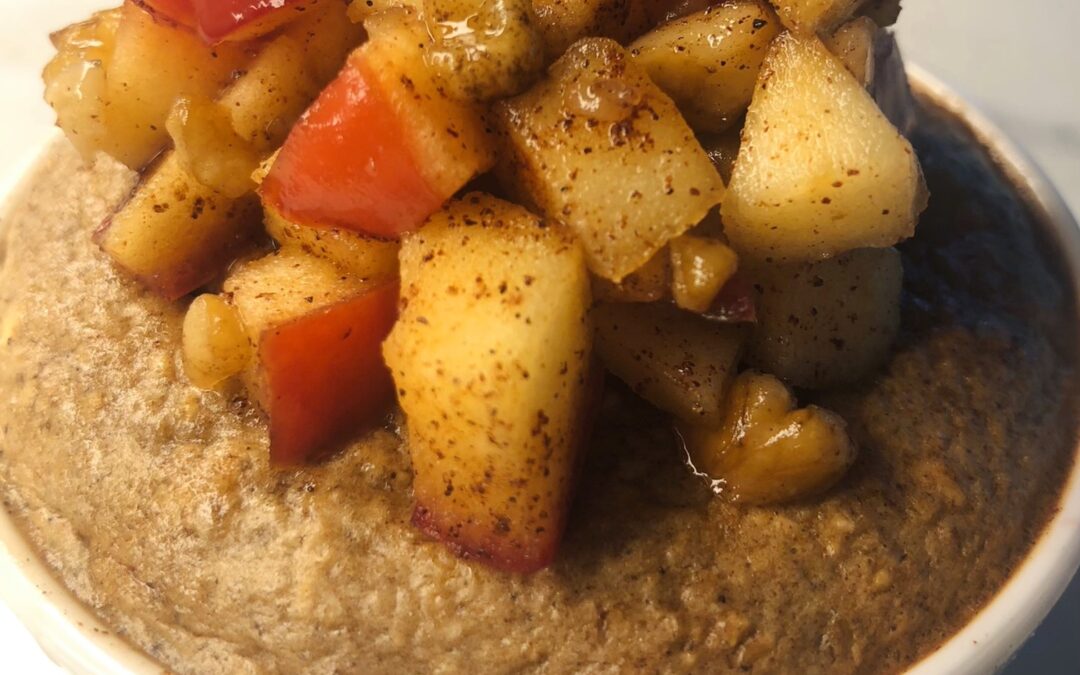
by Julie Pace, RDN | Jan 6, 2022
Apple Pie Baked Oats
This single serving of healthy apple pie oats makes a quick and wholesome breakfast or snack. This recipe is customizable to your taste. Swap out the apple pie spice for other spices that you like or to use whichever spices you have on hand.
Prep Time 5 minutes mins
Cook Time 15 minutes mins
Total Time 20 minutes mins
Course Breakfast, Snack
Cuisine American
- 1/2 cup old fashioned oats organic, Gluten free, if needed
- 1/4 tsp baking powder
- 2 Tbsp maple syrup
- 1/2 tsp vanilla extract
- 3/4 tsp apple pie spice
- dash salt
- 1/2 cup plant-based milk
Apple Pie Topping
- 1/2 apple honeycrisp, diced
- 1 Tbsp walnuts chopped
- 2 tsp plant-based butter
- 2 tsp maple syrup
Oatmeal Mixture
Preheat oven to 375 degrees.
Add oatmeal, baking powder, maple syrup, vanilla, apple pie spice, salt, plant-based milk to blender. Mixture will be thin.
Pour into oven safe ramekin. Place in oven for 15-20 minutes or until set. Remove from oven and top with apple topping.
Topping
In a nonstick skillet on medium heat, add plant-based butter, maple syrup, diced apple, chopped walnuts. Toss around so that apples and walnuts are well coated. Heat about 3-4 minutes until caramelized. Remove and top baked oatmeal. Enjoy!
Keyword Baked oatmeal, oatmeal
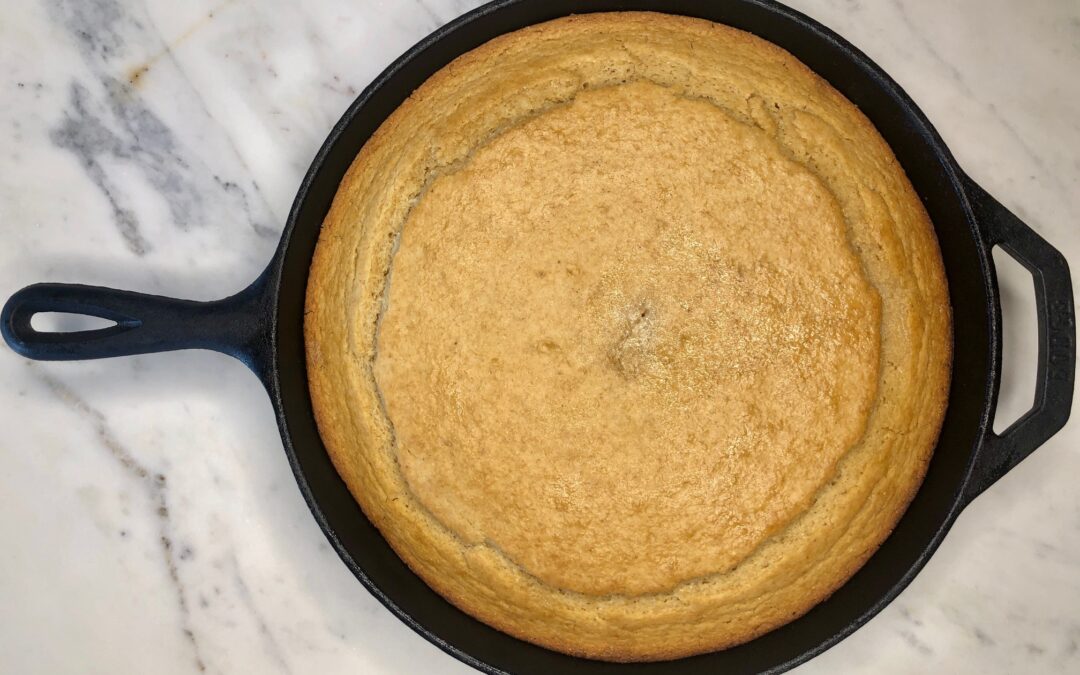
by Julie Pace, RDN | Jan 1, 2022
Looking for the perfect side dish? This easy vegan cornbread recipe is crispy on the outside, moist on the inside, and mildly sweet. Ready in just 30 minutes, it’s ideal for pairing with chili, soups, or holiday feasts. Plus, it’s 100% plant-based, dairy-free, and easy to make in one bowl.
- Try it with our Smoky Red Lentil Soup for a comforting meal.
- Learn more about caring for your cast iron skillet to keep it in top shape.
This plant-based cornbread is the ultimate blend of simplicity and flavor.
Ingredients to Make This Easy, Vegan Cornbread Recipe
- 1 cup cornmeal (I used white cornmeal)
- 1 1/4 cup all-purpose flour (unbleached)
- 2/3 cup maple sugar (I used Crown Maple Sugar, organic and vegan)
- 1 Tbsp baking powder
- 1 tsp salt
- 1 1/2 cup unsweetened almond milk
- 1/4 cup avocado oil
Equipment Needed
- Cast Iron Skillet (8 or 12-inch recommended)
Instructions
- Preheat the Oven:
Preheat your oven to 400°F (200°C). Lightly coat a cast iron skillet with 1 Tbsp of avocado oil and place it in the oven to heat up.
- Mix the Dry Ingredients:
In a medium bowl, whisk together the cornmeal, flour, maple sugar, baking powder, and salt.
- Combine Wet Ingredients:
Add the unsweetened almond milk and avocado oil to the dry ingredients. Mix until smooth.
- Pour Into Skillet:
Carefully remove the hot skillet from the oven. Pour the batter into the skillet and spread it evenly.
- Bake to Perfection:
Place the skillet back into the oven and bake for 20-25 minutes, or until the cornbread is set and a toothpick inserted into the center comes out clean.
Notes
- Sugar Substitute: If you don’t have Crown Maple Sugar, organic cane sugar works well as a substitute.
- Double or Triple the Recipe: For larger skillets, double the ingredients for a 12-inch skillet or triple them for an extra-large skillet.
- Serving Suggestions: Serve warm with vegan butter, maple syrup, or alongside soups and chili.
Why You’ll Love This Vegan Cornbread
- Quick and Easy: Ready in just 30 minutes with minimal cleanup.
- Versatile: Pairs perfectly with savory dishes like chili or as a side for holiday meals.
- Plant-Based: 100% vegan and made with wholesome, dairy-free ingredients.
Easy Vegan Cornbread Recipe
This is one of the best vegan cornbread recipes that you'll ever eat. It's crispy around the edges, moist and mildly sweet in the middle. No one will ever guess this recipe is vegan. It's a one bowl recipe that's so easy to make and on your plate in 20-25 minutes.
Prep Time 5 minutes mins
Cook Time 25 minutes mins
Total Time 30 minutes mins
Course Breads, Side Dish
Cuisine American, vegan
- 1 cup cornmeal I used white cornmeal
- 1-1/4 cup all-purpose flour unbleached
- 2/3 cup maple sugar I used Crown Maple Sugar, organic, vegan
- 1 Tbsp baking powder
- 1 tsp salt
- 1-1/2 cup unsweetened almond milk
- 1/4 cup avocado oil
Preheat oven to 400 degrees F.
Lightly and evenly coat cast iron skillet with 1 Tbsp avocado oil. Place skillet in oven to get hot.
In a medium bowl add first 5 ingredients, then whisk together.
Add plant-based milk and oil to dry ingredients combine until smooth.
Carefully remove hot skillet from oven. Pour mixture into skillet. Place bake into the oven and bake for 20-25 minutes or until set.
*If you are not able to use Crown Maple Sugar, you can use organic cane sugar as the substitution.
** Double or triple this recipe for extra large skillets. I doubled this recipe for my 12 inch cast iron skillet. Keyword Healthy Vegan Recipe, Southern Cornbread

by Julie Pace, RDN | Dec 18, 2021
Stuffed Portobello Mushrooms
This portobello mushroom recipe is absolutely delicious and oh so simple to make. These mushrooms are stuffed with vegan cream cheese, spinach, artichokes, and tasty seasonings. Ready in 25 minutes or less.
Prep Time 10 minutes mins
Cook Time 15 minutes mins
Total Time 25 minutes mins
Course Appetizer, Dinner, Lunch
Cuisine American, dairy free, vegan
Vegan Cream Cheese
- 1-1/4 cup cashews
- 1/4 cup water
- 1-1/2 tbsp apple cider vinegar
Stuffing Ingredients
- 1 cup baby spinach organic, de-stemmed
- 1 cup artichoke hearts
- 1 tsp lemon juice
- 1-2 tsp Old Bay Seasoning
- 1/2 tsp garlic powder organic
- 1/2 tsp onion powder
- 1/2 cup Panko Breadcrumbs divided
- 2 large Portobello Mushrooms rinsed, de-stemmed, cleaned
Preheat oven to 425 degrees. Add cashews, ACV, and water to food processor. Process until smooth and creamy.
Add in spinach, artichokes, lemon juice, and seasonings and process until combined.
Spoon stuffing into mushrooms. Add 1/4 cup Panko breadcrumbs on top of each mushrooms, add an extra dash of Old Bay Seasoning on top of each one for extra flavor.
Place mushrooms on baking pan. Bake for 15-20 minutes on 425 degrees.
Make mini appetizers by using white button mushrooms instead, if desired.
Keyword Easy Dinner Recipes, mushrooms, recipes for parties, vegan appetizers

